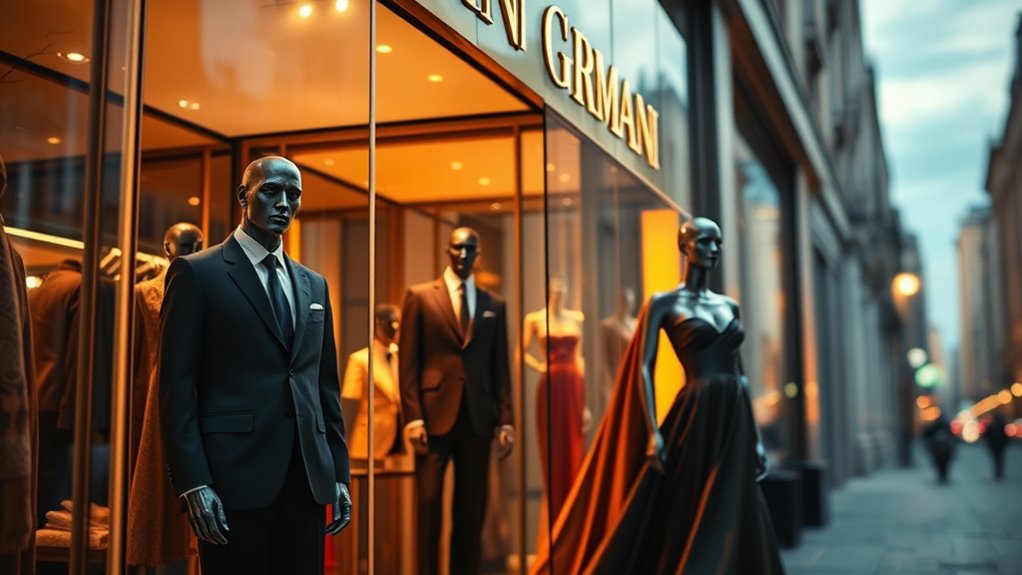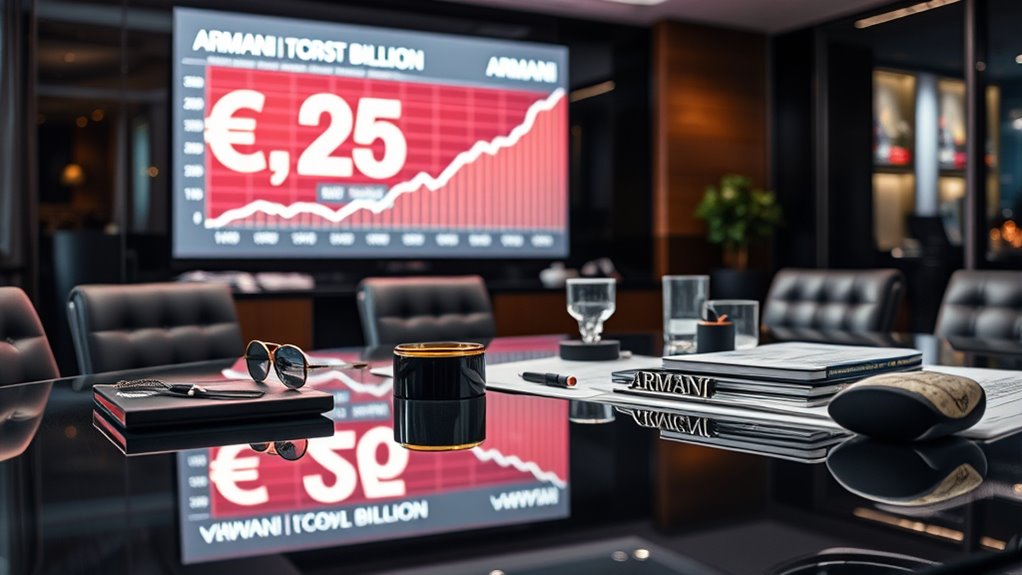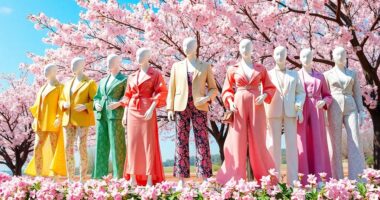Armani’s total global revenues surpass €4.25 billion, thanks to a strong mix of core fashion sales, lucrative licensing agreements, and product diversification. While recent years saw a slight decline in fashion, their licensing deals with L’Oréal and EssilorLuxottica bring in significant income, nearly doubling core sales. Their strategic approach helps maintain resilience in a changing luxury market. If you want to learn how Armani stays competitive despite industry shifts, keep exploring the details behind their success.
Key Takeaways
- Armani’s total brand revenue, including licensing, surpasses €4.25 billion annually.
- Core fashion business generated €2.3 billion in revenue last fiscal year, despite a 5% decline.
- Licensing partnerships with L’Oréal and EssilorLuxottica contribute approximately €2 billion in revenue.
- Licensing nearly doubles the core fashion sales, significantly boosting total revenues.
- Strategic diversification ensures Armani remains resilient in the growing luxury market.

Armani’s Global Revenues
Despite a challenging global luxury market, Armani continues to generate considerable revenue, with its core fashion business reaching €2.3 billion in the most recent fiscal year—a 5% decline from the previous year. This dip reflects broader industry pressures, including slowing demand and shifting consumer preferences toward more casual and accessible styles. Nevertheless, Armani’s overall financial picture remains robust, thanks largely to its diversified revenue streams that go beyond fashion. When you include licensed products like perfumes, cosmetics, and eyewear, the total brand revenue approaches €4.25 billion annually. This substantial figure underscores the strength of Armani’s licensing model, which has been a cornerstone of its business since 1988. The company’s ability to diversify its income has been a key factor in maintaining its market position during turbulent times. The licensing agreements with companies like L’Oréal and EssilorLuxottica are instrumental in this success. L’Oréal handles Armani-branded perfumes and beauty products, generating approximately €1.5 billion per year. These products benefit from L’Oréal’s extensive distribution network and marketing expertise, helping Armani maintain a significant presence in the beauty segment worldwide. Meanwhile, EssilorLuxottica manages the eyewear licensing, contributing around €500 million annually. These long-term partnerships allow Armani to monetize its brand equity globally without bearing direct operational costs. As you consider the company’s overall financial health, it’s clear that these licensing agreements are crucial, nearly doubling the revenue generated from core fashion sales. Giorgio Armani’s passing in September 2025 marks a notable moment in the company’s history. His legacy continues to influence the brand’s resilience and strategic direction, even as potential buyers like LVMH, L’Oréal, and LVMH’s partners evaluate future ownership possibilities. The Armani foundation’s veto powers and long-term contracts with licensees complicate acquisition efforts, ensuring the brand’s independence remains protected. Leadership succession plans emphasize continuity, with trusted collaborators and family members set to steer the company forward. This stability has helped Armani weather market fluctuations while maintaining its reputation for timeless, minimalist elegance. Looking ahead, Armani’s position in the luxury market remains strong. The global personal luxury goods market is projected to grow substantially, from around €385-395 billion in 2024 to over €530-570 billion by 2030. Armani’s balanced approach—focusing on core fashion while leveraging licensing opportunities—positions it well to capitalize on this growth. Its resilience and strategic diversification underscore its ability to adapt without compromising its brand identity. When you consider all these factors, it’s clear that Armani’s total revenues surpass €4.25 billion, making it a formidable player in the luxury industry despite current market headwinds.
Frequently Asked Questions
How Does Armani’s Revenue Compare to Other Luxury Brands?
You see that Armani’s revenue is around €4.25 billion, putting it below top luxury brands like Louis Vuitton, Hermès, and Chanel, but ahead of brands like Fendi. While it’s in the mid-tier segment, it’s considerably smaller than industry giants, limiting its market influence. If you want Armani to grow, focus on expanding brand visibility, boosting sales, and capturing emerging markets to close the gap with the industry’s leaders.
What Regions Contribute Most to Armani’s Global Sales?
Think of Europe as Armani’s 49% powerhouse, dominating global sales with consistent performance and flagship stores like Emporio Armani Milano, much like a Renaissance masterpiece. You see, Europe leads in revenue contribution, followed by the Americas at 22%, with key locations like Madison Avenue boosting sales. Asia-Pacific, facing slowdown, still holds potential. Online sales, rising 35-40%, diversify revenue streams, especially in challenging markets.
How Has Armani’s Revenue Growth Trended Over the Past Decade?
Over the past decade, Armani’s revenue growth has experienced ups and downs. You’ve seen a general decline from 2015 to 2022, reflecting market challenges. However, recent years show stability around €2.3 billion, with some growth driven by digital expansion and flagship investments. Despite short-term setbacks, Armani remains resilient, leveraging its strong brand and strategic focus on e-commerce and flagship stores to adapt and position itself for future growth.
What New Product Lines Are Driving Armani’s Revenue Increase?
Think of Armani’s new product lines as a rising tide lifting all boats, propelling revenue higher. Your focus should be on Armani Beauty’s fragrances, makeup, and skincare, especially innovations like the Vertigo Lift Mascara and Crema Nera Supreme. Additionally, the women’s fashion collection and luxury fragrances like Acqua di Gio Elixir are fueling growth. These offerings captivate consumers, blending tradition with innovation, and driving the brand’s financial ascent.
How Does Armani Plan to Sustain Revenue Growth in the Future?
You can uphold Armani’s revenue growth by focusing on maintaining brand exclusivity and quality, balancing innovation with timeless elegance, and carefully expanding retail locations. Prioritize customer experience through personalized service and product excellence, while protecting the brand’s creative independence. Stay disciplined with financial management, diversify markets, and invest in sustainable practices. By respecting your legacy and adapting thoughtfully, you’ll ensure long-term growth and resilience in a competitive luxury landscape.
Conclusion
You see Armani’s soaring revenues, a proof to its global success, yet behind the numbers lies a brand rooted in timeless elegance. While profits climb higher, the essence of its craftsmanship remains unchanged. The world watches as Armani balances luxury with growth, blending tradition with innovation. In this dance of commerce and artistry, you realize that behind every billion, there’s a story of passion, precision, and a relentless pursuit of perfection.










